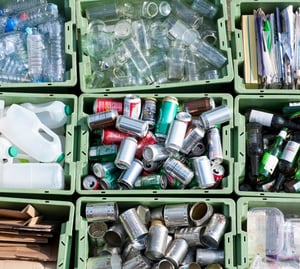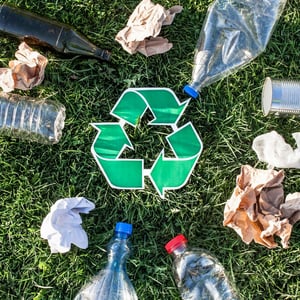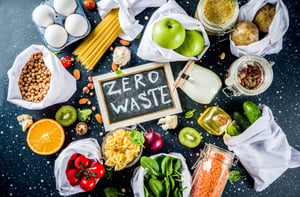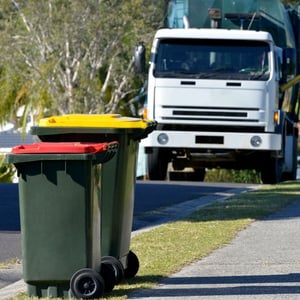
Recycling Labels and Information
Standardised colours for mobile recycling, rubbish and organic materials bins, crates and internal office bins
In October 2015 WasteMINZ, the Glass Packaging Forum and councils around New Zealand agreed on a standardised set of colours for mobile recycling, rubbish and organic materials bins, crates and internal office bins. In 2016 the New Zealand Recycling Symbols (formerly known as the RONZ symbols) were updated to match the colours for mobile recycling and rubbish bins. Companies wishing to implement nationwide recycling schemes are strongly encouraged to use these colours both for their bins and also on their signage. This will ensure that the colours used are consistent with both public place recycling and household recycling.
The agreed standardised colours for mobile recycling and rubbish bins, crates and internal office bins can be found here.

Bilingual recycling signage (RONZ)
There are currently 52 different recycling symbols provided in Te Reo Māori and English with translations by He Kupenga Hao i Te Reo Māori with advice from Para Kore. The PDFs are editable so you are able to replace a kupu (word) if required, in consultation with your local iwi, in recognition of dialectical differences.
Download the signs by clicking on the links below ⬇️

|
Title |
Download Portrait or Landscape |
|
Karaehe Matapihi Glass Window |
|
| Karaehe Patara - Glass bottles | |
|
Karaehe Patara Ipu - Glass Bottles Jars |
|
| Karaehe Patara Ipu Kakariki - Glass Green Bottles Jars | Landscape |
| Karaehe Patara Ipu Koataata - Glass Bottles Jars Clear | Landscape |
| Karaehe Patara Ipu Parauri - Glass Bottles Jars Brown | Landscape |
|
Title |
Download Portrait or Landscape |
|
Para Tahiko - Electronics |
|
| Purere Kainga - Appliances |
|
Title |
Download Portrait or Landscape |
|
Kene Inu - Cans, Drink |
|
| Kene Kai - Cans, Food | |
| Kene Kai Inu - Cans, Food & Drink | |
| Konganuku Kuha - Metal Scrap |
Landscape |
| Konganuku Paepae - Metal Beams | |
| Taea - Tyres |
Landscape |
|
Title |
Download Portrait or Landscape |
|
Oneone - Soil |
|
| Papa Ukutea - Plasterboard | |
| Rakau Noa - Wood Untreated | |
| Rakau Whakauka - Wood Treated |
|
Title |
Download Portrait or Landscape |
|
Para Morearea - Hazardous Lightbulbs |
|
| Para Morearea - Hazardous Oil |
|
Title |
Download Portrait or Landscape |
|
Kai Mara - Food & Garden |
|
|
Para Kai - Food Scraps |
|
|
Para Kai Takai Whakawairakau - Food Compostable Packaging |
|
|
Para Miti - Meat Scraps |
|
|
Tapahanga Mara - Garden Cuttings |
|
|
Whaipara Kawhe - Coffee Grounds 2 tone |
|
|
Whaipara Kawhe - Coffee Grounds |
|
Title |
Download Portrait or Landscape |
|
Kari Maro - Cardboard |
|
|
Pepa Kari Maro - Paper, Cardboard |
|
|
Kātene inu - Drinks Carton |
|
|
Pepa - Paper |
|
|
Taora Pepa Parehuhare - Paper Towels, Napkins |
Background and agreed words
Para Kore and WasteMINZ conducted a nationwide consultation in September 2017 to determine the most suitable translations into te reo Māori for public place recycling and rubbish signage. Speakers of te reo Māori from local iwi, community groups, council staff, universities and government departments were invited to take part in the consultation. Please find below the agreed upon translations. In some cases appropriate alternatives are listed. The majority of these alternatives have a slight variation in meaning rather than being a regional or tribal dialect. E.g. in English the words compost, organic and food scraps have all been used in the past to indicate a bin which food waste goes into however, the agreed upon word in English is now food scraps. This is the case, for example, with the translations for blocks and rubble, poro raima, kongakonga and poraka raima, turakanga.
Where regional variations in usage are possible this has been noted and organisations intending to create signage using those words are encouraged to consult more widely with their local iwi to determine which word would be most suitable. E.g. in English both rubbish and garbage have the same meaning but one is British English and the other American. For example regional variations for the word clothes include but aren't limited to kākahu, pūeru, pūweru, weru, weweru, kaka.
.png?width=300&name=Hangarua%20(1).png)
|
English Term |
Agreed Translations |
Appropriate Alternatives |
|
Appliances |
Pūrere Kāinga |
Utauta Kāinga |
|
Bags & Wrap |
Pēke, Tākai |
|
|
Blocks & Rubble |
Poro Raima, Kongakonga |
Poraka Raima, Turakanga |
|
Bottles & Jars |
Pātara, Ipu Karaehe |
|
|
Brown |
Parauri |
|
|
Cans |
Kēne |
|
|
Cardboard |
Kāri Mārō |
|
|
Cartridges |
Kariri Waituhi |
|
|
Clear |
Kōataata |
|
|
Clothes & Rags |
Pūeru, Ruha |
Kākahu Karukaru (note regional variations are possible consult locally) |
|
Coffee Grounds |
Whaipara Kawhe |
Kawhe Ngakungaku Orooronga Kawhe Nakunga Kawhe |
|
Concrete |
Raima |
|
|
Containers |
Ipu |
|
|
Drink |
Inu |
|
|
Electronics |
Para Tāhiko |
Para Hiko |
|
Fabric |
Papanga |
|
|
Fonterra Milk Bottles |
Pātara Miraka nā Fonterra |
|
|
Food |
Kai |
|
|
Food & Drink |
Kai, Inu |
|
|
Food & Garden |
Kai, Māra |
Mahinga Kai (note regional variations are possible - consult locally) |
|
Food Scraps |
Para Kai |
|
|
Food Scraps & Compostable Packaging |
Para Kai, Tākai Pōpopo |
|
|
Furniture |
Taputapu whare |
|
|
Garden Cuttings
|
Tapahanga Māra
|
Tapahitanga Māra |
|
Glass
|
Karaehe
|
Karāhe Kōata |
|
Green |
Kākāriki |
|
|
Hazardous |
Para Mōrearea |
|
|
Household Batteries |
Pūhiko Kāinga |
|
|
Landfill |
Ruapara |
|
|
Light Bulbs |
Pūrama |
|
|
Liners |
Ārai |
|
|
Meat Scraps |
Para Mīti |
Para Kikokiko |
|
Metal |
Konganuku |
Mētara |
|
Metal Beams |
Paepae Konganuku |
|
|
Metal Scrap |
Kuha Konganuku |
Toenga Mētara Kongakonga Mētara |
|
Nappies |
Kope |
|
|
Oil |
Hinu |
|
|
Paper |
Pepa |
|
|
Plastic |
Kirihou |
|
|
Plasterboard |
Papa Ukutea |
|
|
Polystyrene |
Kirihou Kōmāmā |
|
|
Recycling |
Hangarua |
Hakarua is Ngāi Tahu dialect for Hangarua. |
|
Reuse |
Whakamahia Anō |
|
|
Rubbish |
Para |
Rāpihi |
|
Shopping Bags |
Pēke Hokohoko |
|
|
Soft Plastic |
Kirihou Ngohengohe |
|
|
Soil |
Oneone |
|
|
Strapping |
Tarapu ( loan word) |
Here |
|
Towels & Napkins |
Tāora, Parehūhare |
Tāora, Napikena |
|
Treated Timber |
Rākau Tāoke |
Rākau Tāroki |
|
Tyres |
Taea |
Wīra |
|
Untreated Timber |
Rākau Noa |
|
|
Window |
Matapihi |
|
|
Wood |
Rākau |
|
Zero waste events guidance
Effective signage helps to minimise contamination in recycling bins and decreases missed capture (recyclables ending up in the rubbish bin). A guidance document “Zero Waste events guidance” has been created showing examples of effective signage for events and outlining considerations to consider when developing signage.

New Zealand suppliers of indoor and outdoor recycling bins and accessories
A list providing details of New Zealand suppliers of indoor and outdoor recycling bins and accessories can be found here. The document is focused on the needs of commercial operations but could be applicable to households and schools. Inclusion in this document does not confer any preference or recommendation, suppliers are listed alphabetically and was last updated in 2024.
Please contact Leeana Tamati on leeana@wasteminz.org.nz if you know of any changes that need to be made to this list.






